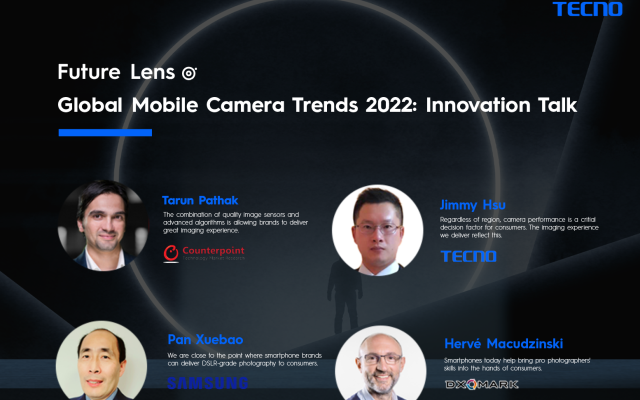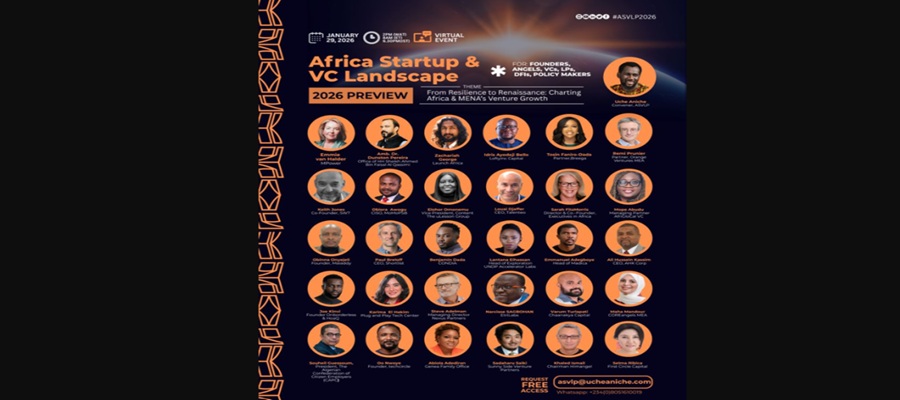Telecom
Experts Share Global Mobile Camera Trends for 2022

Leading industry research analysts along with global experts in the field of optical imaging technology have shed light on what the smartphone industry can expect in 2022 with respect to mobile cameras, during a webinar titled “Global Mobile Camera Trends 2022: Innovation Talk”.

Discussions focused on how camera systems are evolving, and how they have become critical for OEMs as consumers place increasing importance on image capture. Innovations such as the combination of quality image sensors and advanced software algorithms, light sensitivity, image and video stabilization, and continuous lossless zoom have been highlighted by these industry players as Mobile camera trends to continue in the coming year.
The webinar was organized by leading technology research firm Counterpoint, and included were guest speakers from TECNO, a global smartphone brand focusing on rapid-growth in emerging markets, Samsung Electronics, a global leader in semiconductor, telecommunication, digital media and digital convergence technologies, and DXOMARK, an internationally renowned testing agency specializing in cameras, audio, displays, and batteries for consumer electronics.
Hosted by Counterpoint Research’s Peter Richardson, VP of Research, speakers Tarun Pathak, Hervé Macudzinski, Pan Xuebao, and Jimmy Hsu shared their insights on camera innovation, market trends, and the latest developments in imaging technology.
Tarun Pathak, research director for smartphones at Counterpoint, highlighted that burgeoning mid-end smartphones across both developed and emerging markets like Africa, Latin America and India will help form factors of quad-cameras and above to dominate. Mr. Pathak also sees “the combination of quality image sensors and advanced software algorithms allowing brands to deliver great imaging experiences across all smartphone price points.”
DXOMARK’s Hervé Macudzinski, Image Science Director and Product Owner of DXOMARK observed that smartphones today help bring DSLR capture quality and pro photographer’s skills into the hands of consumers. Further, he sees low-light imaging as a priority for devices in the highly competitive $400-$600 price bands – where significant improvements can be made.
Pan Xuebao, Samsung Electronics’ VP and Head of R&D, believes “We’re close to the point where smartphone brands can now deliver DSLR-grade photography in the hands of customers.” He mentioned Samsung’s Tetra and Nona technology is bringing great performance across both bright and low light conditions by providing a bigger canvas to capture more light, while allowing smaller pixels for higher definition. Speed is also prioritized, with ISOCELL bringing faster autofocus capabilities. ”
Jimmy Hsu, Senior Product Manager of TECNO Image Technology, mentioned that demand for more diverse features and personalization could drive demand for ToF (time of flight) and DVS (dynamic vision sensor), which would help smartphone cameras rivals and outperform specialized cameras.
TECNO already focuses on personalization, with advances in dark complexion imaging aimed at users across key markets in Africa, India and other regions, with Hsu highlighting recent achievements and breakthroughs regarding light sensitivity, image and video stabilization, zoom and high-resolution – powered by technologies such as RGBW and G+P, Sensor Shift and telescopic lenses.
He promised some of these new technologies are slated for TECNO’s new products in 2022. Hsu also emphasized that “TECNO always aims to provide an excellent photo and video experience through constant innovation and a deep understanding of consumers’ needs.”
Media representatives and industry players from Africa, Southeast Asia, Europe, and the US also participated in the webinar, sharing their questions with the speakers on topics that interest tech-savvy mobile users and photo enthusiasts globally.
The webinar highlighted future mobile camera imaging technology trends and set expectations of the application of these imaging technologies for global markets and consumers, paving the way for further long-term smartphone imaging developments.
Telecom
ASVLP 2026: Africa, MENA VCs Gear Up as Tech Funding Hits $4.1bn Rebound

As Africa and MENA’s startup ecosystems transition from post-correction resilience into a new phase of disciplined growth, the Africa Startup & VC Landscape Preview (ASVLP 2026) will convene leading founders, investors, policymakers, and ecosystem builders on January 29, 2026, for its second annual, agenda-setting virtual forum.

Following a challenging global venture cycle, 2025 marked a notable rebound across the African ecosystem, with startups raising an estimated $3.2–$3.3 billion over the full year.
The recovery was accompanied by significant structural shifts: Kenya emerged as the leading destination among Africa’s “Big Four” markets for the first time, while Nigeria recorded a year-on-year funding decline, reflecting changing investor preferences, macroeconomic pressures, and a broader recalibration toward capital efficiency and sustainability.
Sectorally, fintech remained the most funded vertical, while climate & energy, AI-enabled solutions, healthtech, and infrastructure-adjacent businesses gained increasing attention. Across Africa and MENA, development finance institutions (DFIs) and family offices played a more pronounced role in anchoring funds, deploying catalytic capital, and supporting blended-finance structures, reshaping how early-stage and growth capital is mobilized.
ASVLP 2026 is designed to translate these data points into forward-looking strategy.
The forum will bring together venture capitalists, angel investors, LPs, DFIs, family offices, founders, corporate leaders, and regulators from Africa, MENA, Europe, and North America to assess 2025 outcomes and chart priorities for 2026.
The program will feature keynotes, fireside chats, panels, and deep-dive roundtables, including discussions on:
· The 2026 Africa & MENA FinTech Landscape, focusing on security, profitability, regulation, and growth frontiers
· Emerging Fund Managers, capital formation, and LP alignment
· Talent, operator depth, and institutional capacity as constraints to scale
· Regulatory evolution and cross-border market integration
A major highlight of ASVLP 2026 will be the Final DealRoom Pitch Session, where a curated group of high-potential startups will present to an experienced panel of investors.
• Founders can apply to pitch via: bit.ly/ASVLP-DR-Founders
• Investors seeking DealRoom access can request entry via: bit.ly/ASVLP-DR-Investors
Confirmed speakers for ASVLP 2026 include Khaled Ismail (HIMangel), Idris Ayodeji Bello (LoftyInc Capital), Zachariah George (Launch Africa), Tosin Faniro-Dada (Breega), Selma Ribica (FirstCircle Capital), Maha Mandour (COREangels MEA), Joe Kinvi (Borderless), Remi Prunier (Orange Ventures MEA), Karima El Hakim (Plug and Play Tech Center), Souheil Guessoum (President, The Confederation of Citizen Employers – Algeria (CAPC)), Remi Prunier (Partner, Orange Ventures, MEA), Maha Mandour (COREAngels MEA), Ali Hussein (President, Kenyan FinTech Association), Patrick Okebu (CIO, Interswitch Group) among other leading voices shaping capital, policy, and innovation across the region.
“The conversation has shifted,” said Uche Aniche, Convener of ASVLP. “It’s no longer about whether capital will return to Africa and MENA, but what kind of capital, deployed with what discipline, and in service of which long-term outcomes. ASVLP exists to help the ecosystem make sense of that transition.”
Participation in ASVLP 2026 is free but strictly by invitation.
Interested participants are encouraged to repost the official announcement on LinkedIn and comment #ASVLP2026 to receive a private registration link. They could also email [email protected] and request invite.
Telecom
TikTok, Instagram Blamed in US Youth Suicide Lawsuit

Major social media giants Meta Platforms, TikTok and Alphabet’s YouTube will face a landmark jury trial this week in Los Angeles County Superior Court over allegations that their addictive designs have fuelled a youth mental health crisis, marking the first such case to reach this stage.

Social Media
The pivotal personal injury lawsuit centres on a 19-year-old Californian woman identified as K.G.M., who claims her childhood immersion in Instagram, Facebook, YouTube and TikTok—engineered with endless scrolls, autoplay videos, notifications and algorithms—sparked severe anxiety, depression and suicidal thoughts.
Dozens of similar suits have surged since 2022 from families, schools and states, accusing the firms of burying internal research on teen harms while prioritising ad revenue through youth-targeted engagement hooks, despite Section 230 protections for user content.
Plaintiffs seek damages and design overhauls, arguing platforms bypassed parents and preyed on vulnerable kids; defendants counter there’s no clinical “social media addiction” diagnosis, no proven causation—kids with issues often use less—and they’ve added safeguards like parental controls and time limits.
Echoing Australia’s under-16 bans, the trial will scrutinise thousands of internal documents, expert testimonies and K.G.M.’s story, potentially expanding tech liability amid debates where studies show complex links, not direct causation, between screen time and disorders like eating issues or self-harm.
A win could mandate warning labels, age gates or algorithm tweaks, reshaping global platforms as U.S. Surgeon General advisories and global scrutiny intensify pressure on Big Tech to prioritise child safety over profits.
Telecom
Meta Tests Paid Subscriptions Across Instagram, Facebook, WhatsApp

Meta is gearing up to trial paid subscription services on Instagram, Facebook, and WhatsApp, aiming to diversify revenue streams beyond advertising while maintaining free core access for all users.

Meta
The subscriptions will offer enhanced tools tailored for everyday users, creators, and businesses, including advanced content creation, sharing, and workflow features distinct from the existing Meta Verified verification program. Unlike a uniform rollout, Meta plans varied testing formats per app to match diverse audiences, experimenting with feature bundles based on user feedback to refine the model.
A key element involves integrating Manus, the autonomous agent firm Meta acquired for $2 billion in December, into these apps alongside its enterprise sales. Manus enables complex task automation with minimal input, with early signs like Instagram shortcuts already spotted by reverse engineer Alessandro Paluzzi.
Video tools feature prominently: Meta’s Vibes short-form video generator in the Meta AI app shifts to freemium, where paid tiers unlock higher monthly creation limits beyond the free baseline. On Instagram, subscriptions could enable unlimited audience lists, non-follower tracking, and anonymous Story views, though specifics for Facebook and WhatsApp remain under wraps.
Drawing from Meta Verified’s 2023 launch—which provides badges, support, and protection mainly for creators—these broader plans target wider appeal amid industry shifts. Ad growth slows against TikTok competition, while Snapchat+ boasts 16 million subscribers at $3.99 monthly, proving demand for value-driven paid perks despite subscription fatigue risks from streaming and storage fees.
Meta will phase tests gradually, prioritizing feedback to shape long-term viability without alienating free users.

 News3 days ago
News3 days agoLIRS to Invoke NTAA to Recover Unpaid Taxes from Bank Accounts, Others

 News3 days ago
News3 days agoAnambra Cuts Monday Pay to Kill Sit-at-Home

 E-Financial3 days ago
E-Financial3 days agoNIBSS, Others Flag 13,417 Nigerian Fraudsters on Person of Interest Portal

 E-Financial3 days ago
E-Financial3 days agoFirst Asset Management Receives Upgraded Ratings from Agusto &Co and DataPro

 E-Financial3 days ago
E-Financial3 days agoCBN Prepares Fresh Debit Card Rules to Improve ATM Services

 General News3 days ago
General News3 days agoNigeria Treats Religious Violence as Attack on State – NSA Ribadu

 E-Financial2 days ago
E-Financial2 days agoCBN Upgrades Licences of Opay, Moniepoint, Kuda, Palmpay, Paga to National Status
- E-Financial2 days ago
Nigeria’s 9 Top FinTech Firms Valued at $10.6Bn in January 2026



























